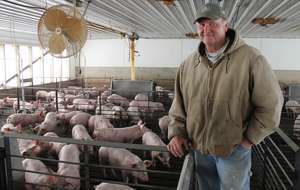
After posting a blog on June 5 about some of the conservation efforts that I’ve implemented on my farm, that afternoon I decided to start a Facebook conversation about sustainable agriculture. I posted this comment in my Facebook status: “Sustainable… Tell me what you think this should mean to my farm.”
Keep in mind that I have a variety of friends on Facebook, but the conversation started with mostly farmers and ranchers telling me “sustainable” meant to them. Here’s one response from a friend of mine whose family operates a Discovery Farm in Arkansas:
I think sustainable doesn’t mean you can’t evolve. What my in-laws have done has sustained their farm for over 100 years. My family farm has been sustained for over 63 years. Our farming practices, which include a lot of new technology, should sustain our farms definitely for our children who farm with us now as well as their children and grandchildren. We work every day for sustenance. Without it, we have no tomorrow. The land is our livelihood. Why would we not want sustainable Ag? It’s just OUR definition!
Because I really wanted to hear from what I know can be a very vocal group of people not directly involved with farming, I specifically reached out to some of my urban friends. One such response follows:
I think sustainable is a literal definition. What does the farmer have to do, not only to sustain the growing capacity of the piece of farmland, but to NOT adversely affect the water? If the land is pumping out crop after crop, but is also rendering the community’s water undrinkable, that is not sustainable. Something has to give. Also, the attitude that the “farmer should decide” everything that goes on his land, yet still receive federal dollars no matter what, is ridiculous. Like it or not, our society works with carrots and sticks. We reward good behavior and punish bad behavior. Farmers are not immune to that formula.
Did you notice the first thing my city friend hit me with was “to sustain the growing capacity of the piece of farmland, but to NOT adversely affect the water”? I could not possibly agree with her more! Most farmers know that they must take care of the land and water to keep farming. They genuinely want to be good stewards of the land. Many of them are interested in taking care of their land in order to pass it on to the next generation.
My urban friend also said that farmers should expect to give us some autonomy when making decisions if they receive Federal dollars. Her comment reflects the viewpoint of many who believe crop insurance should be tied to conservation. This topic is getting a lot of discussion, but I believe there are many reasons why crop insurance should not be tied to conservation. First of all, what if something like a flood happens? A natural disaster like this would knock the farmer out of compliance, and it’s possible he or she would also not have insurance coverage. A double disaster! I would rather see a stand-alone bill drafted to keep “bad players” in line.
The debate on whether to tie conservation to crop insurance continues, but it’s just one issue of contention. About 80% of the 2012 Farm Bill is non-farm related. Ironic, huh? With such a complex document (980 pages already), the Agriculture Reform, Food and Jobs Act of 2012 will undoubtedly be swamped with amendments.
All anyone can do is give his/her input to our elected officials. Make your voice heard, and get involved in the bill-making process. If you sit back and watch, you really have no right to complain about the outcome!
